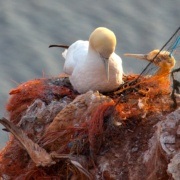What’s the deal with the Plastic Soup again?
March 15 2024 That’s what readers of news site nu.nl on their comment platform Nujij were wondering. In a recent […]
5 August 2020
If we all continue on the current path, by 2040, we will create twice as much plastic waste, and the total amount of plastic in the ocean will be quadrupled. The current measures against plastic soup are inadequate. We won’t make it by banning bags and straws or improving the recycling of plastic, but change is possible! Radical, system-oriented, and globally applied solutions can reduce plastic pollution by 80%.
These conclusions are drawn in a new economic systems analysis entitled ‘Breaking The Plastic Wave: A Comprehensive Assessment of Pathways Towards Stopping Ocean Plastic Pollution.‘ The report was published by the US NGO The Pew Charitable Fund and the London-based consulting firm Systemiq (collaborating with the Universities of Leeds and Oxford, the Ellen MacArthur Foundation and Common Seas). It appeared at the same time as the article ‘Evaluating Scenarios Toward Zero Plastic Pollution’ in Science.
Reports on the plastic soup appear weekly, but the added value of ‘Breaking The Plastic Wave’ is that it puts things into perspective and provides methodological support for that analysis. There is no single solution to the problem. The report places eight solutions (including reduction, redesign, collection, and recycling) in relation to each other and relates them to different scenarios (whether or not to intervene). In addition, the researchers take factors such as population growth and geographical differences into account.
To give an example: a significant reduction in plastic can be achieved by tackling six categories of use; multilayer flexibles, business-to-business packaging, films, bottles, carrier bags, and food service disposables. The current measures mainly address the last two, but they represent only a small percentage of the total. Tackling multi-layer recyclable packaging (such as sachets) provides the most significant environmental gain, but this is not happening now.
One of the most important solutions is to improve the collection of waste, especially in remote places and countries where infrastructure is mostly lacking. This is known as the ‘collection gap.’ Currently, according to the researchers, an estimated 25% of waste is dumped directly into waterways.
Considering the increase in population, to close this gap, 500,000 new people will have to be connected to a waste collection service every day (!) from now until 2040. This is an immense task, especially for countries that do not have sufficient financial resources. The researchers combine this solution with other system interventions, such as redesign and an obligatory share of recyclate in plastic. This increases the value of waste and prevents plastic from being dumped. Recycling must be made more attractive by, among other things, levying a tax on new (virgin) plastic.
The report assumes a situation in which plastic will still play a dominant role in our daily lives. The starting point is to prevent plastic (macro and micro) from ending up in the environment. Two issues remain underexposed in the report: health effects and grassroots initiatives.
Measures that prevent plastic from ending up in the environment contribute to health. The researchers see this as an additional benefit. For them, the promotion of human health is not an end in itself. But this aspect will increasingly prove to be a game-changer. Based on more scientific insights, governments will set (additional) requirements for plastics to limit health risks. That is why the Plastic Soup Foundation has made human health one of the spearheads in the fight against plastic waste.
The zero waste-movement is also underexposed. These are initiatives that originate from local communities to live without waste. Residents no longer want to pollute their environment with plastic. It turns out that a much more substantial reduction of plastic is possible than the researchers assume.
March 15 2024 That’s what readers of news site nu.nl on their comment platform Nujij were wondering. In a recent […]
The first Impact Fair is Europe’s largest Impact Experience. An interactive ‘immersive’ experience of impactful examples.
The waste-export to countries outside of the EU has been restricted The Netherlands is against a carpet ban on shipping of plastic waste.
The waste-export to countries outside of the EU has been restricted The Netherlands is against a carpet ban on shipping of plastic waste.

 APPROACH TO DOLLY ROPE IN SUP-DIRECTIVE FALLS SHORT
APPROACH TO DOLLY ROPE IN SUP-DIRECTIVE FALLS SHORT